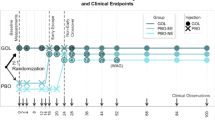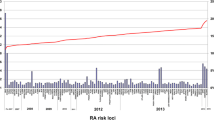Abstract
Rheumatoid arthritis patients exhibit a considerable interindividual variability in response to drug treatment. Although many disease-related and demographic factors have been studied to predict treatment outcome, the effective disease-modifying antirheumatic drug (DMARD) therapy is not yet allocated based on factors that predict efficacy. Individual genetic characteristics are thought to play an important role in treatment response; therefore, current research aims to identify these genetic predictors for clinical response. Pharmacogenetic studies are beginning to provide results, which suggests that personalized treatment maximization of DMARD efficacy and minimization of adverse drug reactions are feasible.
Similar content being viewed by others
References and Recommended Reading
Eichelbaum M, Ingelman-Sundberg M, Evans WE: Pharmacogenomics and individualized drug therapy. Annu Rev Med 2006, 57:119–37.
Evans WE, McLeod HL: Pharmacogenomics—drug disposition, drug targets, and side effects. N Engl J Med 2003, 348:538–549.
Weinshilboum R, Wang L: Pharmacogenomics: bench to bedside. Nat Rev Drug Discov 2004, 3:739–748.
Tugwell P, Welch V, Suarez-Almazor M, et al.: Efficacy and toxicity of old and new disease modifying antirheumatic drugs. Ann Rheum Dis 2000, 59(Suppl 1):i32–35.
Bagley PJ, Selhub J: A common mutation in the methylenetetrahydrofolate reductase gene is associated with an accumulation of formylated tetrahydrofolates in red blood cells. Proc Natl Acad Sci U S A 1998, 95:13217–13220.
Weisberg I, Tran P, Christensen B, et al.: A second genetic polymorphism in methylenetetrahydrofolate reductase (MTHFR) associated with decreased enzyme activity. Mol Genet Metab 1998, 64:169–172.
Mandola MV, Stoehlmacher J, Zhang W, et al.: A 6 bp polymorphism in the thymidylate synthase gene causes message instability and is associated with decreased intratumoral TS mRNA levels. Pharmacogenetics 2004, 14:319–327.
Marsh S: Thymidylate synthase pharmacogenetics. Invest New Drugs 2005, 23:533–537.
Lepper ER, Baker SD, Permenter M, et al.: Effect of common CYP3A4 and CYP3A5 variants on the pharmacokinetics of the cytochrome P450 3A phenotyping probe midazolam in cancer patients. Clin Cancer Res 2005, 11:7398–7404.
Laverdiere C, Chiasson S, Costea I, et al.: Polymorphism G80A in the reduced folate carrier gene and its relationship to methotrexate plasma levels and outcome of childhood acute lymphoblastic leukemia. Blood 2002, 100:3832–3834.
Marie S, Heron B, Bitoun P, et al.: AICA-ribosiduria: a novel, neurologically devastating inborn error of purine biosynthesis caused by mutation of ATIC. Am J Hum Genet 2004, 74:1276–1281.
Goto Y, Yue L, Yokoi A, et al.: A novel single-nucleotide polymorphism in the 3’-untranslated region of the human dihydrofolate reductase gene with enhanced expression. Clin Cancer Res 2001, 7:1952–1956.
Serra M, Reverter-Branchat G, Maurici D, et al.: Analysis of dihydrofolate reductase and reduced folate carrier gene status in relation to methotrexate resistance in osteosarcoma cells. Ann Oncol 2004, 15:151–160.
Heil SG, Van der PutNM, Waas ET, et al.: Is mutated serine hydroxymethyltransferase (SHMT) involved in the etiology of neural tube defects? Mol Genet Metab 2001, 73:164–172.
Plosker GL, Croom KF: Sulfasalazine: a review of its use in the management of rheumatoid arthritis. Drugs 2005, 65:1825–1849. [Published erratum appears in Drugs 2005, 65:2591.]
Hein DW, Doll MA, Fretland AJ, et al.: Molecular genetics and epidemiology of the NAT1 and NAT2 acetylation polymorphisms. Cancer Epidemiol Biomarkers Prev 2000, 9:29–42.
Suarez-Almazor ME, Spooner C, Belseck E: Azathioprine for rheumatoid arthritis. Cochrane Database Syst Rev 2000, 2:CD001461.
Gaffney K, Scott DG: Azathioprine and cyclophosphamide in the treatment of rheumatoid arthritis. Br J Rheumatol 1998, 37:824–836.
Coulthard SA, Matheson EC, Hall AG, Hogarth LA: The clinical impact of thiopurine methyltransferase polymorphisms on thiopurine treatment. Nucleosides Nucleotides Nucleic Acids 2004, 23:1385–1391.
Tanaka E, Taniguchi A, Urano W, et al.: Pharmacogenetics of disease-modifying anti-rheumatic drugs. Best Pract Res Clin Rheumatol 2004, 18:233–247.
Dervieux T, Orentas Lein D, Marcelletti J, et al.: HPLC determination of erythrocyte methotrexate polyglutamates after low-dose methotrexate therapy in patients with rheumatoid arthritis. Clin Chem 2003, 49:1632–1641.
Dervieux T, Furst D, Lein DO, et al.: Polyglutamation of methotrexate with common polymorphisms in reduced folate carrier, aminoimidazole carboxamide ribonucleotide transformylase, and thymidylate synthase are associated with methotrexate effects in rheumatoid arthritis. Arthritis Rheum 2004, 50:2766–2774.
Dervieux T, Furst D, Lein DO, et al.: Pharmacogenetic and metabolite measurements are associated with clinical status in patients with rheumatoid arthritis treated with methotrexate: results of a multicentred cross sectional observational study. Ann Rheum Dis 2005, 64:1180 -1185.
Kumagai K, Hiyama K, Oyama T, et al.: Polymorphisms in the thymidylate synthase and methylenetetrahydrofolate reductase genes and sensitivity to the low-dose methotrexate therapy in patients with rheumatoid arthritis. Int J Mol Med 2003, 11:593–600.
Wessels JA, Vries-Bouwstra JK, Heijmans BT, et al.: Efficacy and toxicity of methotrexate in early rheumatoid arthritis are associated with single-nucleotide polymorphisms in genes coding for folate pathway enzymes. Arthritis Rheum 2006, 54:1087–1095.
Berkun Y, Levartovsky D, Rubinow A, et al.: Methotrexate related adverse effects in patients with rheumatoid arthritis are associated with the A1298C polymorphism of the MTHFR gene. Ann Rheum Dis 2004, 63:1227–1231.
Pawlik A, Wrzesniewska J, Fiedorowicz-Fabrycy I, Gawronska- Szklarz B: The MDR1 3435 polymorphism in patients with rheumatoid arthritis. Int J Clin Pharmacol Ther 2004, 42:496–503.
Criswell LA, Lum RF, Turner KN, et al.: The influence of genetic variation in the HLA-DRB1 and LTA-TNF regions on the response to treatment of early rheumatoid arthritis with methotrexate or etanercept. Arthritis Rheum 2004, 50:2750–2756.
Corominas H, Domenech M, Laiz A, et al.: Is thiopurine methyltransferase genetic polymorphism a major factor for withdrawal of azathioprine in rheumatoid arthritis patients? Rheumatology (Oxford) 2003, 42:40–45.
Nikas SN, Voulgari PV, Alamanos Y, et al.: Efficacy and safety of switching from infliximab to adalimumab: a comparative controlled study. Ann Rheum Dis 2006, 65:257–260.
Furst DE: Anakinra: review of recombinant human interleukin-I receptor antagonist in the treatment of rheumatoid arthritis. Clin Ther 2004, 26:1960–1975.
Smith AJ, Keen LJ, Billingham MJ, et al.: Extended haplotypes and linkage disequilibrium in the IL1R1-IL1A-IL1B-IL1RN gene cluster: association with knee osteoarthritis. Genes Immun 2004, 5:451–460.
van GaalenFA, van AkenJ, Huizinga TW, et al.: Association between HLA class II genes and autoantibodies to cyclic citrullinated peptides (CCPs) influences the severity of rheumatoid arthritis. Arthritis Rheum 2004, 50:2113–2121. A publication demonstrating that carriership of SE confers the risk of presence of ACPA antibodies.
van der Helm-van MilAH, Verpoort KN, Breedveld FC, et al.: The HLA-DRB1 shared epitope alleles are primarily a risk factor for anti-cyclic citrullinated peptide antibodies and are not an independent risk factor for development of rheumatoid arthritis. Arthritis Rheum 2006, 54:1117–1121.
Huizinga TW, Amos CI, van der Helm-van MilAH, et al.: Refining the complex rheumatoid arthritis phenotype based on specificity of the HLA-DRB1 shared epitope for antibodies to citrullinated proteins. Arthritis Rheum 2005, 52:3433–3438.
Mugnier B, Balandraud N, Darque A, et al.: Polymorphism at position -308 of the tumor necrosis factor alpha gene influences outcome of infliximab therapy in rheumatoid arthritis. Arthritis Rheum 2003, 48:1849–1852.
Fonseca JE, Carvalho T, Cruz M, et al.: Polymorphism at position -308 of the tumour necrosis factor alpha gene and rheumatoid arthritis pharmacogenetics. Ann Rheum Dis 2005, 64:793–794.
Marotte H, Pallot-Prades B, Grange L, et al.: The shared epitope is a marker of severity associated with selection for, but not with response to, infliximab in a large rheumatoid arthritis population. Ann Rheum Dis 2006, 65:342–347.
Cuchacovich M, Ferreira L, Aliste M, et al.: Tumour necrosis factor-alpha (TNF-alpha) levels and influence of -308 TNF-alpha promoter polymorphism on the responsiveness to infliximab in patients with rheumatoid arthritis. Scand J Rheumatol 2004, 33:228–232.
Martinez A, Salido M, Bonilla G, et al.: Association of the major histocompatibility complex with response to infliximab therapy in rheumatoid arthritis patients. Arthritis Rheum 2004, 50:1077–1082.
Padyukov L, Lampa J, Heimburger M, et al.: Genetic markers for the efficacy of tumour necrosis factor blocking therapy in rheumatoid arthritis. Ann Rheum Dis 2003, 62:526–529.
Turner D, Grant SC, Yonan N, et al.: Cytokine gene polymorphism and heart transplant rejection. Transplantation 1997, 64:776–779.
Kang CP, Lee KW, Yoo DH, et al.: The influence of a polymorphism at position -857 of the tumour necrosis factor alpha gene on clinical response to etanercept therapy in rheumatoid arthritis. Rheumatology (Oxford) 2005, 44:547–552.
van VollenhovenRF, Klareskog L: Clinical responses to tumor necrosis factor alpha antagonists do not show a bimodal distribution: data from the Stockholm tumor necrosis factor alpha followup registry. Arthritis Rheum 2003, 48(6):1500–1503. Work demonstrating that clinical response to TNF-α blockers displays normal or skewed distribution.
Criswell LA, Lum RF, Turner KN, et al.: The influence of genetic variation in the HLA-DRB1 and LTA-TNF regions on the response to treatment of early rheumatoid arthritis with methotrexate or etanercept. Arthritis Rheum 2004, 50:2750–2756.
Dieude P, Cornelis F: Genetic basis of rheumatoid arthritis. Joint Bone Spine 2005, 72:520–526.
Schotte H, Schluter B, Drynda S, et al.: Interleukin 10 promoter microsatellite polymorphisms are associated with response to long term treatment with etanercept in patients with rheumatoid arthritis. Ann Rheum Dis 2005, 64:575–581.
Criswell LA, Lum RF, Turner KN, et al.: The influence of genetic variation in the HLA-DRB1 and LTA-TNF regions on the response to treatment of early rheumatoid arthritis with methotrexate or etanercept. Arthritis Rheum 2004, 50:2750–2756.
Tutuncu Z, Kavanaugh A, Zvaifler N, et al.: Fcgamma receptor type IIIA polymorphisms influence treatment outcomes in patients with inflammatory arthritis treated with tumor necrosis factor alpha-blocking agents. Arthritis Rheum 2005, 52:2693–2696.
Camp NJ, Cox A, di Giovine FS, et al.: Evidence of a pharmacogenomic response to interleukin-l receptor antagonist in rheumatoid arthritis. Genes Immun 2005, 6:467–471. The.rst report on association of IL1 polymorphisms and treatment outcome with anakinra.
Hattersley AT, McCarthy MI: What makes a good genetic association study? Lancet 2005, 366:1315–1323. One to read. Discusses issues important for the design of association studies.
Author information
Authors and Affiliations
Corresponding author
Rights and permissions
About this article
Cite this article
Wesoly, J., Wessels, J.A.M., Guchelaar, HJ. et al. Genetic markers of treatment response in rheumatoid arthritis. Curr Rheumatol Rep 8, 369–377 (2006). https://doi.org/10.1007/s11926-006-0068-5
Issue Date:
DOI: https://doi.org/10.1007/s11926-006-0068-5




